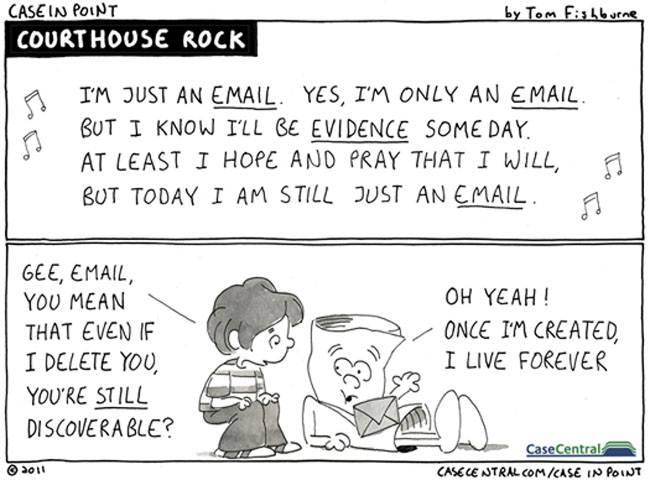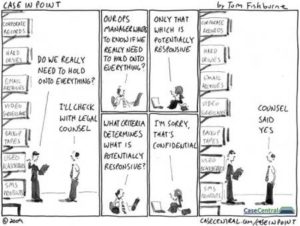
24 Mar You Have The Electronic Dirt – Now What?
In last week’s post we discussed your company’s options when it suspects that the opposing party has destroyed evidence and is keeping it hidden either before or during a lawsuit. What if your company has the information it needs to prove a former employee took its proprietary information? What do you do now? Your company must understand not only how to use technology to take advantage of this information, it must also understand its own data in order to properly preserve it for litigation.
Data, especially electronic data, is not much use to your company in litigation if it doesn’t have an attorney who is technologically savvy and knows how to interpret and cull electronically stored information or ESI. Your lawyer has an ethical duty to have a level of knowledge, skill and preparation to handle litigation in the midst of evolving technologies. See ABA Model Rule 1.1. Specifically, Model Rules of Professional Conduct R 1.1, comment 8, states that a lawyer’s ethical obligation requires a legal understanding of the benefits and risks associated with relevant technology.
Thus you must ensure your lawyer can and will take the following steps once retained to handle your case’s discovery needs:
- Initially assess your company’s e-discovery needs and any issues with meeting those needs. Before your company launches an investigations into an opponent’s ESI, it will want to make sure it has all of its ducks in a row. Thus after your attorney has analyzed and understands your company’s ESI systems and storage, your attorney must adequately interview your company’s IT representatives to understand the client’s fundamental IT issues, including the IT infrastructure and how your company’s retention policy or policies are implemented by that department. Your attorney will also want to identify custodians of relevant ESI at your company to ensure they have been following these policies, and to advise them and your company on available options for collecting and preserving ESI.
- Implement appropriate preservation procedures for your company. If your company does not have any preservation procedures in place to ensure relevant information is not destroyed or lost, your attorney must be able to work with your company in implementing such procedures. Your attorney should be able to identify the legal issues involved with the generation, receipt, transfer, storage, preservation and destruction of ESI so that your company understands the importance of having preservation procedures in place, and the overall impact your company’s technology decisions will have on its legal rights and obligations.

- Perform the appropriate searches internally and externally, through proper measures, and if already in litigation, collect and produce responsive ESI in a recognized and appropriate manner while preserving its integrity. This is a key step for your organization. In both searching for and collecting responsive ESI, your attorney will need to ensure your company’s and any nonparties’ privileges or rights in trade secrets or privacy are adequately protected throughout the preservation, collection and production of ESI.
- Assess your opponent’s ESI systems and storage through appropriate litigation measures. Once in litigation, your attorney will need to understand the scope of any e-discovery efforts to gather information on your opponent’s ESI systems and storage, and to obtain the appropriate ESI from your opponent or a non-party.
- Competently and meaningfully meet and confer with opposing counsel concerning an e-discovery plan. Your attorney’s ability to effectively meet and confer with opposing counsel could have an instrumental impact on the success of your company’s discovery efforts. Your company’s attorney will want to engage opposing counsel early in the process, which allows counsel to reach agreements about ESI issues before discovery dispute arise; avoid possible sanctions or challenges to preserving, collecting and producing ESI; and ensure appropriate protection of the rights and property interests of the parties and non-parties.
If your attorney is not technologically savvy, this deficiency could be overcome by the attorney either by acquiring the sufficient learning before taking on your company’s case or, better yet, acquiring or consulting with technical consultants or other attorneys who specialize in ESI. There are a number of law firms and lawyers who have specialized knowledge in the area of technology, with whom less experienced counsel can associate. If your company is considering litigation and would like to discuss its ESI concerns with an attorney, call Edwards Law today for a complimentary consultation.


No Comments